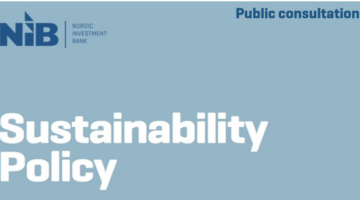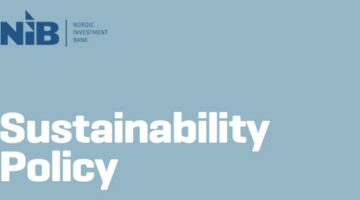Provide us with your comments!
NIB’s Board of Directors approved the updated Sustainability Policy for public consultation on 30 September 2021. The consultation process is open for 30 days. We invite our stakeholders to provide comments on the document by 30 October 2021.
Please send your feedback to info@nib.int with “Sustainability Policy” in the subject field.
Sustainability Policy renewal process
First approval
NIB's Board of Directors approve a version of the Sustainability Policy for public consultation.
Public consultation
NIB invites stakeholders to comment on the updated document. After 30 days have passed, an internal NIB discussion considers the received contributions, and possibly make an amended version of the Sustainability Policy for a separate Board of Directors approval. If, after the public consultation period, there are no changes to the policy, it shall be deemed approved.
Possible second approval
NIB's Board of Directors is informed about the outcome of public consultation. In case adjustments have been made to the document, the Board has to approve the amended Sustainability Policy.
Entry into force
NIB's launches its updated Sustainability Policy. The Bank publishes the contributions received after the consultation period (if the author's consent is given) and NIB's response to the consultation, explaining the outcome of the process.
Sustainability policy updated
NIB’s updated Sustainability Policy has entered into force on 11 November 2021.
“NIB’s updated Sustainability Policy reflects that we are running out of time, and that we really need to step up efforts to decarbonise the energy sector. So, we are taking a very clear stance, we will not finance any fossil fuel-based energy generation,” said Luca De Lorenzo, Head of Sustainability and Mandate at NIB, during the launch event at COP26.
We appreciate all the contributions received during the public consultation. NIB has responded to all the contributors personally. Below please see the summaries of contributions for which the consent to publish was given and NIB’s responses to them, respectively.
Contribution, Affirmative Investment Management, email
Contribution, Affirmative Investment Management, attachement
NIB has been a signatory to the Task Force for Climate Related Disclosures (TCFD) since 2020. We are continuously working on better integrating climate risks in our risk management frameworks as well as understanding the overall carbon footprint of our lending portfolio. Although Paris agreement aligned financing is a difficult concept to claim, NIB’s ambition is to be able to say its financing is in line with the Paris agreement backed by a robust methodology and data.
As a signatory of TCFD, we are also in the process of measuring the emissions associated with our lending portfolio. This is part of the process that will help NIB to consider setting targets and its overall approach on a Paris agreement aligned pathway.
NIB is continuously looking at expanding our sustainable product offering. The Bank has just signed its first sustainability-linked loan and has been approved as an implementing partner of the InvestEU risk sharing mechanism.
Earlier in 2021, NIB also published its “Responsible Investment Framework”, a document related to the Sustainability Policy, in which the Bank explains how ESG factors are taken into consideration in NIB’s investment decisions in detail.
NIB recognises the need for a variety of solutions to be deployed in order to transition to a carbon-free energy system. As such, the Sustainability Policy focuses on directly excluding highly emitting projects, primarily based on fossil fuels, or projects that directly harm the environment, for instance, those the mining operations mentioned in the contribution.
The existing nuclear energy generation is and will likely remain a relevant source of the carbon-free baseload generation. As pointed out in the contribution, some countries see nuclear energy as an integral part of climate strategies, while other countries are phasing out nuclear energy. NIB will carefully follow the debate on nuclear energy and the potential technology developments in the future.
For NIB, the food industry is indeed a very important sector in many ways: for climate in terms of direct emissions and land use; for animal rights; and for water contamination and eutrophication, which is significant in the Baltic Sea.
The new Sustainability Policy has been sharpened and simplified, and thus remains at a higher level than the previous policy. However, the Sustainability Policy will be complemented by “Lending ESG guidelines”, a separate document where the categorization of projects (A, B, C) will be reported as in the previous policy.
The Sustainability Policy is only the first filter in the assessment process for NIB’s lending, which is conducted during the Mandate Rating process and includes a strengthened ESG assessment. During these assessments, all relevant ethical and/or environmental considerations will be taken into account and ultimately considered on a case-to-case basis before deciding on whether to grant financing for specific projects.
NIB is a public Bank with a dual mandate and the overall mission to support a prosperous and sustainable Nordic-Baltic region. NIB values both productivity gains and environmental benefits in its Mandate Rating Framework. We recognize that these two mandates work best hand in hand, and that successful societies and companies will be the ones that marry sustainability with economic gains. The Bank aims to support projects which score high on both mandates.
The Sustainability Policy and the Mandate Rating Framework are two documents that work together in defining and assessing NIB’s lending. The Sustainability Policy was last updated in 2012, so we place urgency on updating this document first. The Mandate Rating Framework, as it is rightly mentioned in the contribution, is from 2019. It is NIB’s aim to maintain these documents as updated as possible, with regards to technological developments, external selection criteria, such as the green bond principles and the new EU taxonomy, overall sustainable finance targets and our owners’ guidance.
NIB welcomes a continued dialogue on those topics raised in the contribution, as we highly value external input to our views and documents.
Links
Contacts
Mr Luca De Lorenzo
Senior Director
Head of Sustainability & Mandate
+358 10 618 0297
Mr Jukka Ahonen
Senior Director
Head of Communications
+358 10 618 0295


